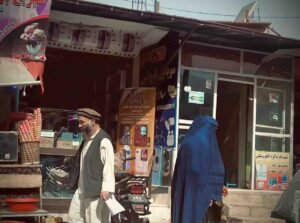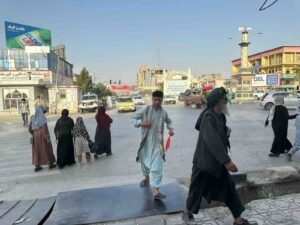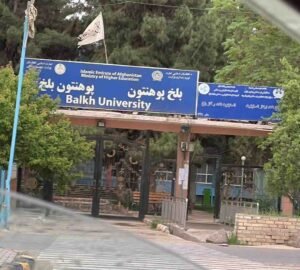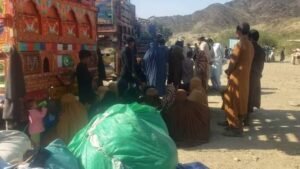Three Years of Gender Apartheid in Afghanistan: Assessing the Impact and Charting a Path Forward
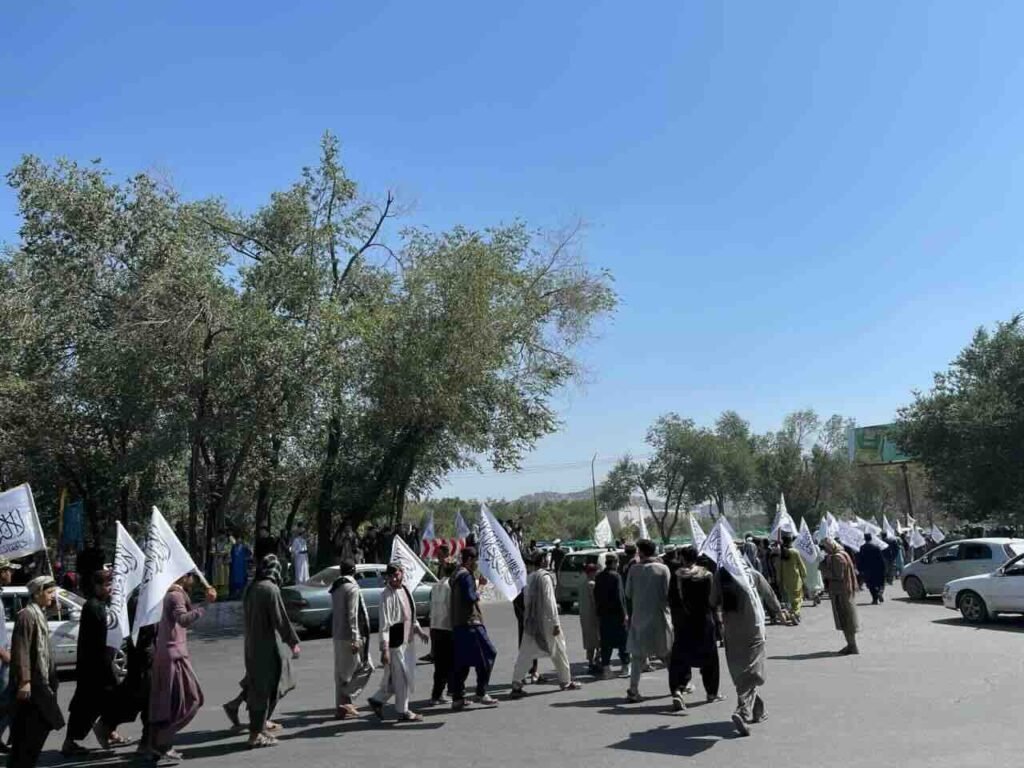
Taliban supporters with the group's official flag on the streets of Kabul, August 15, 2024. Photo by @AADIL for ADN.
By Deema Hiram, Enayat Nasir, Rahim Jami, and Zarqa Yaftali
The Taliban has completed three years of power in Afghanistan[i], forcibly seizing control and subsequently making it the only country where girls are barred from secondary education[ii] and systematic discrimination is enforced. This action blatantly disregards international ethics and laws, erasing years of progress in education and banning a universally accepted principle[iii]. The world is now faced with a critical decision: will it passively accept this situation or take action? The implications of this choice are far-reaching, as the global community is already overburdened with complex issues.
Since assuming power in mid-2021[iv], the Taliban regime has imposed increasingly stringent restrictions on women and girls in Afghanistan[v]. A cornerstone of these policies has been the complete prohibition of female secondary education[vi]. Moreover, the regime has enacted over 100 decrees[vii] that severely curtail women’s participation in public life, including employment, higher education, and freedom of movement.
The Taliban’s policies have had devastating consequences for Afghan women and girls[viii]. Over a million young women[ix] have been denied the opportunity to continue their education beyond primary school, with this number growing as each new class graduates. Tens of thousands of female university students have been forced out of the classroom[x]. With no opportunity to pursue higher education, their futures hang in the balance. Meanwhile, countless women have lost their jobs in government and non-profit sectors[xi], further marginalizing them from public life. These are just a few examples of the Taliban’s systematic suppression of women’s rights.
The Taliban’s brutal crackdown on women and girls has sparked global outrage[xii]. Afghans from diverse backgrounds[xiii], as well as the international community, have united in condemning these actions[xiv] and demanding equal rights for all Afghans, especially women. Rarely has there been such widespread consensus on a single issue in Afghanistan.
Despite widespread national and global condemnation and pressures, the Taliban has defiantly maintained its oppressive course[xv]. Far from embracing educational equality, the regime has intensified its crackdown on women and girls. To silence dissent, the Taliban has imposed strict censorship, stifled free speech, and disbanded thousands of grassroots organizations, particularly those led by women. Activists face harsh reprisals, while humanitarian aid organizations operate under severe restrictions[xvi].
The Taliban’s discriminatory policies reflect a shortfall in the global response to Afghanistan[xvii]. The international community has struggled to hold the Taliban accountable, inadvertently allowing the regime to solidify its position. The decision of some regional countries to establish official ties with the Taliban[xviii] has further emboldened the group to enforce its oppressive measures.
The Afghan people, particularly women, have borne the brunt of the crisis. While the Taliban’s discriminatory policies have systematically eroded women’s rights[xix], the international community’s inadequate response has exacerbated the situation. Half of the population – Afghan women – have been stripped of their fundamental freedoms, and over 90% of the population[xx] now lives in poverty.
In the educational sector, the Taliban has imposed their own version of education, grounded in a narrow and extremist interpretation of religion. Hundreds of Jihadi Madrasas have been set up across the provinces[xxi]. Their supporters, who received credentials[xxii], are now university instructors and government employees. This shift aims to replace the Republic era’s, human rights-based education with a narrow, extremist ideology.
The devastating consequences of these systematic violations and abuses, which qualify as gender apartheid[xxiii], cannot be ignored. They ripple across local, regional, and international levels, with the potential to further fuel extremism[xxiv], human rights abuses[xxv], mass migration[xxvi], and various forms of transnational organized crime[xxvii]. The deteriorating situation in Afghanistan threatens to undermine progress towards a peaceful and just world order. As the globe grapples with challenges like poverty, climate change, extremism, and human rights abuses, the crisis in Afghanistan adds another layer of complexity and instability.
Without a significant shift in international policy and a stronger stance against the Taliban’s abuses, the situation in Afghanistan is likely to worsen. The potential consequences of unchecked Taliban rule are dire and could destabilize an already fragile global order.
A clear and effective path forward must be established to address the ongoing crisis in Afghanistan. By cultivating hope and exerting sustained pressure, we can work to transform the current repressive regime. Critical lessons learned from the past three years must be applied to empower the Afghan people to exercise their fundamental rights and freedoms, enabling them to become constructive contributors to global peace and development.
Given the urgent, severe situation, we, the Afghan human rights activists, call on the UN, its member states, Islamic countries, and organizations involved in Afghanistan to address the following issues quickly and effectively:
- Condemn and Contain: Employ a dual strategy of unequivocally condemning the Taliban’s human rights abuses while implementing measures to contain their influence and prevent further harm.
- Conditionality and Leverage: Make all forms of engagement with the Taliban strictly conditional on concrete improvements in human rights, particularly for women and girls.
- Global Coalition: Build a united front of nations to isolate the Taliban diplomatically and impose targeted sanctions on those responsible for human rights violations.
Human Rights and Gender Equality
- Center Women’s Rights: Place women’s rights at the core of all Afghanistan-related policies and decisions. Ensure that Afghan women have a meaningful voice in shaping the country’s future.
- Invest in Education: Prioritize investment in education, particularly for girls, as a long-term strategy for empowering women and building a more stable Afghanistan.
- Support Civil Society: Strengthen civil society organizations working to advance women’s rights and human development, providing them with the resources and protection they need to operate effectively.
Humanitarian Assistance and Accountability
- Humanitarian Corridors: Establish safe humanitarian corridors to ensure unhindered access for aid workers and delivery of life-saving assistance to vulnerable populations.
- Aid Accountability: Implement robust mechanisms to track and monitor the use of aid funds, preventing diversion by the Taliban and ensuring that assistance reaches those most in need.
- Independent Monitoring: Support independent monitoring and documentation of the humanitarian situation, including the impact of Taliban policies on women and girls.
- International Criminal Court (ICC): Refer the situation in Afghanistan to the ICC to investigate and prosecute those responsible for grave crimes, including crimes against humanity and gender apartheid.
- Global Justice Mechanism: Establish an international mechanism to hold the Taliban accountable for its actions and to provide reparations to victims.
- Countering Hate Speech: Condemn and counter hate speech and incitement to violence targeting women and girls, both online and offline.
By adopting these recommendations, the international community can demonstrate a clear commitment to upholding human rights, supporting the people of Afghanistan, and holding the Taliban accountable for its actions.
Written by
Deema Hiram: Education Champion, Founder and Managing Director of Canadian Equal Education Support Organization
Enayat Nasir: Education Champion, Founder of Youth Coordination and Empowerment Network
Rahim Jami: Education Champion, Founder and Managing Partner of Education Defenders Network
Zarqa Yaftali: Education Champion, Founder of Women and Children Research and Advocacy Network
Note: The contents of the article are of sole responsibility of the author. Afghan Diaspora Network will not be responsible for any inaccurate or incorrect statement in the articles.
[i] https://apnews.com/article/afghanistan-taliban-three-years-anniversary-68f5bc4a3cdd9d07dcecd5d6d391df5c
[ii] https://www.nbcnews.com/news/world/afghanistan-taliban-school-year-girls-barred-class-rcna144071
[iii] https://www.un.org/en/about-us/universal-declaration-of-human-rights
[iv] https://www.cfr.org/backgrounder/taliban-afghanistan
[v] https://www.usip.org/publications/2023/12/how-taliban-enables-violence-against-women
[vi] https://apnews.com/article/taliban-banned-afghanistan-girls-school-e49d168375edc1ef5df97fec301af662#:~:text=When%20the%20Taliban%20ruled%20Afghanistan,they%20also%20banned%20girls’%20education.&text=The%20Taliban%20has%20barred%20girls,such%20restrictions%20on%20female%20education.
[vii] https://msmagazine.com/2023/08/15/list-timeline-taliban-orders-women-girls-afghanist/
[viii]https://press.un.org/en/2023/sc15222.doc.htm#:~:text=%E2%80%9CSince%20the%20Taliban%20seized%20power,been%20decimated%2C%E2%80%9D%20she%20said.
[ix] https://theconversation.com/i-spent-a-decade-helping-afghan-girls-make-educational-progress-and-now-the-taliban-are-using-these-3-reasons-to-keep-them-out-of-school-225956
[x] https://www.voanews.com/a/taliban-s-female-university-education-ban-marks-one-year/7406898.html
[xi] https://news.un.org/en/story/2024/01/1145782
[xii] https://foreignpolicy.com/2022/03/29/taliban-girls-education-ban-reversal-afghanistan-schools/
[xiii] https://www.theguardian.com/world/2022/mar/26/open-the-schools-afghanistan-girls-protest-taliban-kabul-for-right-to-education
[xiv] https://foreignpolicy.com/2022/03/29/taliban-girls-education-ban-reversal-afghanistan-schools/
[xv] https://theconversation.com/i-spent-a-decade-helping-afghan-girls-make-educational-progress-and-now-the-taliban-are-using-these-3-reasons-to-keep-them-out-of-school-225956
[xvi] https://www.thenewhumanitarian.org/news-feature/2023/03/02/afghanistan-ingos-find-workarounds-taliban-ban-on-women-ngo-work
[xvii] https://www.lawfaremedia.org/article/why-international-leverage-has-failed-with-the-taliban
[xviii] https://asia.nikkei.com/Politics/International-relations/Afghanistan-turmoil/Taliban-defy-West-at-U.N.-talks-while-China-Russia-eye-closer-ties
[xix] https://www.hrw.org/news/2024/02/06/taliban-and-global-backlash-against-womens-rights
[xx] https://www.rescue.org/article/afghanistan-entire-population-pushed-poverty
[xxi] https://thediplomat.com/2024/01/jihadi-seminaries-under-the-taliban-a-looming-threat/
[xxii] https://enayatnasir.substack.com/p/diploma-mill-the-political-agenda
[xxiii] https://www.usip.org/publications/2023/09/two-years-talibans-gender-apartheid-afghanistan
[xxiv] https://www.usip.org/publications/2023/08/two-years-under-taliban-afghanistan-terrorist-safe-haven-once-again
[xxv] https://www.amnesty.org/en/location/asia-and-the-pacific/south-asia/afghanistan/report-afghanistan/
[xxvi] https://8am.media/eng/mass-exodus-from-afghanistan-how-taliban-rule-compels-afghans-to-flee/
[xxvii] https://globalinitiative.net/analysis/taliban-terrorism-ocindex/#:~:text=In%20addition%2C%20non%2Drenewable%2D,extremist%20groups%2C%20including%20the%20Taliban.



